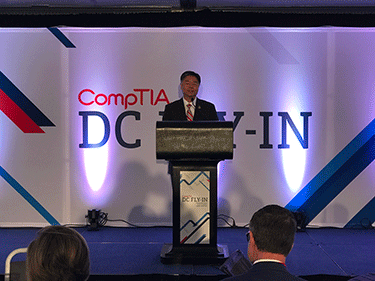 Wednesday morning began with the Capitol Hill morning speaker series featuring members of Congress and high-ranking officials from the executive branch. We received an informative overview of government priorities for the coming year around the tech agenda. The information shared allowed attendees to increase their knowledge of issues before hitting the halls of Congress for an afternoon of Fly-In meetings.
Wednesday morning began with the Capitol Hill morning speaker series featuring members of Congress and high-ranking officials from the executive branch. We received an informative overview of government priorities for the coming year around the tech agenda. The information shared allowed attendees to increase their knowledge of issues before hitting the halls of Congress for an afternoon of Fly-In meetings.
Our first speaker was Tim Herbert, CompTIA’s Sr. Vice President of Research & Market Intelligence who gave an overview of our annual Cyberstates report which quantifies the size and scope of the tech sector and the tech workforce across multiple vectors. He discussed time-average wages, employment growth, expectations for the 2017 IT hiring landscape, and key trends shaping the tech landscape including 3-D printing, drones, and virtual reality.
He said top business priorities that will help align tech and business are customer engagement/growth, operational workflow efficiencies, innovation, and staff skills. Herbert also discussed the 2017 CompTIA Industry Outlook which highlights four trends likely to impact the IT industry including: 1) cloud tools; 2) security; 3) more work by data teams to bridge the gap between IT and business; and 4) the bigger role that Internet of Things (IoT) will play in altering physical environments and social conventions.
Our next speaker was Rep. Derek Kilmer (WA-6) who began by talking about the importance of protecting businesses from digital threats. He said, “Cyber incidences are becoming far too common. There are too many bad actors out there trying to do harm to businesses.” As a result, Kilmer and former Rep. Richard Hanna (R-NY) introduced the Small Business Cyber Security Act in the last Congress to help American entrepreneurs protect themselves from cybercrimes and create cybersecurity plans that meet business’ needs. This bill— which increases federal assistance to small businesses helping them protect against digital threats—passed the House last fall.
Kilmer also talked about the importance of making government data more accessible to encourage new discoveries in the private sector. “We are working with CompTIA on the OPEN Government Data Act, which would require that public data be accessible at Data.gov to ensure that individuals, organizations, and other government offices can access it. By embracing open data, we can give innovators new tools to help fuel breakthroughs.” Kilmer also discussed the importance of continuing to build out a cybersecurity workforce, increasing investment in STEM, connecting every community, particularly those in rural areas, to the online world, as well as the importance of pushing for dedicated cyber funding at the state level.
Rep. Ted Lieu (CA-33) was our next speaker. He is only one of four members in the House with a Computer Science degree and currently serves as a Colonel in the Air Force Reserves. He began by pointing to his phone and saying, “Our mobile devices need better security” and then discussed the experience of having an iPhone hacked during an appearance he had on a CBS' “60 Minutes” program. "The 60 Minutes team exploited a security flaw they discovered in Signaling System Seven -- or SS7. It is a little-known, but vital global network that connects phone carriers.” After the program aired, Lieu pushed for an FCC investigation of SS7.
Lieu stressed the importance of protecting more than just our desktop computers, “Mobile phones have completely transformed how we do our work. It’s important that they are protected and are less hackable . . . we are looking to the private sector to help.”
Our final speaker was Maureen Ohlhausen, FTC Chairman (Acting) who began by explaining the mission of Federal Trade Commission (FTC) – or as it sometimes is humorously referred to as the Federal “Technology” Commission. “The FTC’s mission is to protect consumers and promote competition in the U.S. economy. We have worked to stay up to date about the online marketplace and the privacy issues it raises for consumers. We have hosted numerous public workshops, issued reports on online data collection practices, monitored industry self-regulatory efforts, and closely followed technological developments affecting consumer privacy.”
Ohlhausen also offered some observations about the recent FCC privacy ruling, noting that the FCC’s approach doesn’t necessarily match the FTC’s approach thus raising compliance challenges for the industry. “We will see how this plays out in this administration.”
Ohlhausen said that FTC’s role in investigating data security cases affords FTC regulators interesting insights and a unique perspective on how to best protect consumers in an ever-changing digital environment. In an attempt to share that knowledge, the FTC published Start with Security, A Guide for Businesses: Lessons Learned from FTC Cases (PDF). She said that "lessons learned" were culled from more than 50 law enforcement actions resulting from FTC investigation leads. She is now directing the FTC to include in the guide lessons from closed security cases – “these will be important lessons to help your company improve its security practices and ultimately, protect consumers.”
The remainder of Fly In was devoted to meetings on Capitol Hill. This year, we are calling on members of Congress to join us to develop and introduce the “CHANCE in TECH Act” an education and workforce bill specifically for tech – an important facet of developing our tech workforce.

